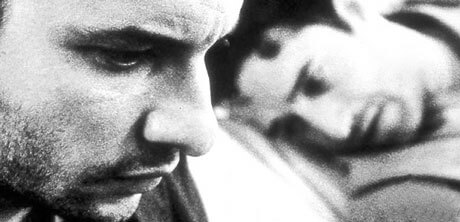Gay filmmaker captures simmering tension between two men facing an imminent death
Love it or hate it, there is a stunning, six-minute sequence in “Son Frère” (“His Brother”) that many viewers will find hypnotizing. The main character, Thomas (Bruno Todeschini) is lying in a hospital bed, and two nurses slowly shave off all of his body hair. This sequence is dramatized not only to convey the medical necessity of the operation—Thomas is about to undergo a splenectomy—but also the more symbolic act of transformation and change.
“Son Frère,” directed by gay French filmmaker Patrice Chéreau is about the estranged relationship between Thomas and his younger sibling Luc (Eric Caravaca). Thomas is straight and Luc is gay, and they have not had much contact during their adult years. Now, Thomas contacts his brother to say he is dying from an exotic blood disease—not leukemia, not HIV—in which his platelets are dwindling, and he could hemorrhage at any moment and die. This may be the last chance for the brothers to make amends.
While the film’s story sounds like something out of the bad disease movie of the week genre, “Son Frère” is far superior to anything you will likely see on television. Chéreau gets up close and intimate with his characters. Many scenes are shot in silence, with a hand-held camera, and the effect lends a vibrant urgency to the action. The film pulses with an immediacy that is hard to shake—if viewers can bring themselves to watch. This is a difficult, at times painful film, but also one that has its rewards.
Significantly, Chéreau does not flinch from showing uncomfortable things. From medical procedures and surgical scars, to a tense argument between the brothers, there are many raw, absorbing moments. When one brother says to the other, “You deserted me when I needed you most,” the effect is gut wrenching.
Despite the film’s undeniable power, Chéreau curiously presents the events out of sequence, starting in the summer and flashing back and forth to the winter. This non-linear structure provides an interesting prism for the action, but it also robs the story of some of its impact.
Nonetheless, “Son Frère” excels in depicting the way the characters react to Thomas’ condition. Whereas some of his loved ones cannot deal with his deterioration, Luc becomes emboldened by it. Viewers are also likely to be divided in their response.
The performances are nothing short of miraculous. Bruno Todeschini, who was nominated for a Cesar (French Oscar) for this role, is simply astonishing. Gaunt and fragile throughout, he conveys the anguish and suffering of a patient who cannot understand why his body is failing. Todeschini is superb, and he is well matched by his co-star. As Luc, Caravaca is wonderfully expressive. His response to Thomas’ weakening condition is remarkable, but he also has great moments interacting with other characters. When he meets a 19-year-old patient in the hospital, and when he argues with his boyfriend Vincent, his reactions to these men are pitch-perfect.
“Son Frère” is an unusual film because although there are doses of sentiment amid all of the harsh realism, Chéreau avoids making the film overly emotional. Viewers will become so engaged in the lives of these characters that the drama of watching Thomas dying has an intensity that need not be overdone. Even though a somber Marianne Faithfull song plays on the soundtrack—perhaps to help jerk the tears—viewers may find themselves more unsettled than moved, a strange but not entirely inappropriate response to such a compelling film.
We also publish:




































